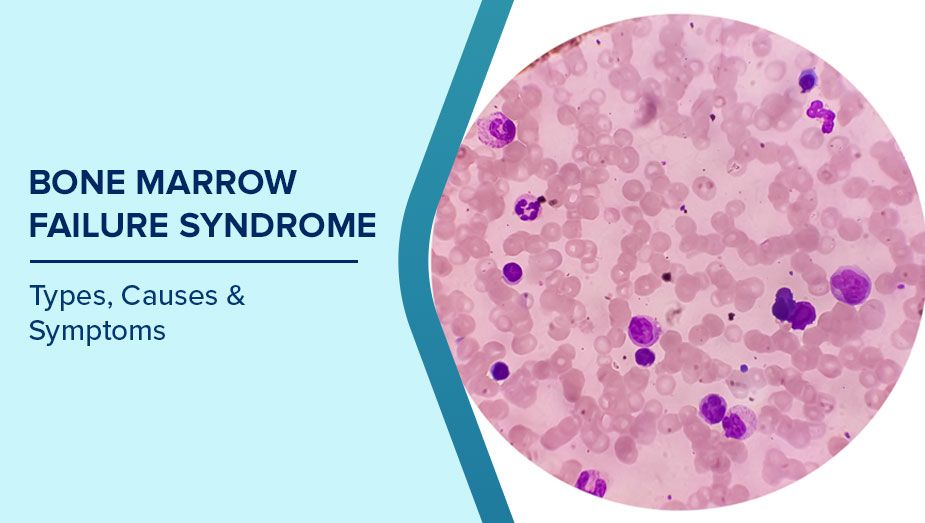Bone Marrow Failure Syndromes (BMFS) Treatment in India
Bone Marrow Failure Syndromes (BMFS) are rare but serious conditions in which the bone marrow is unable to produce adequate blood cells, leading to anemia, infection risk, and bleeding problems. These can be acquired or inherited and require precise diagnosis and specialized treatment.
In India, the total cost of BMFS treatment ranges from $10,000 to $40,000, depending on the specific condition and treatment approach (supportive care, immunosuppressive therapy, or bone marrow transplant).
What Are Bone Marrow Failure Syndromes?
Bone Marrow Failure Syndromes (BMFS) are rare but serious conditions in which the bone marrow is unable to produce adequate blood cells, leading to anemia, infection risk, and bleeding problems. These can be acquired or inherited and require precise diagnosis and specialized treatment.
How many Types of Bone Marrow Failure Syndromes?
Bone marrow failure syndromes can be classified into:
-
Aplastic Anemia
A condition where the immune system attacks bone marrow stem cells, leading to a severe drop in red cells, white cells, and platelets. Patients often experience fatigue, frequent infections, and easy bruising. Treatments include immunosuppressive therapy and bone marrow transplant. -
Myelodysplastic Syndromes (MDS)
A group of clonal disorders in which the bone marrow produces abnormal, poorly functioning blood cells. It may evolve into acute myeloid leukemia (AML) if not treated. Treatment options range from supportive transfusions to hypomethylating agents and stem cell transplantation. -
Paroxysmal Nocturnal Hemoglobinuria (PNH)
A rare acquired condition marked by red blood cell breakdown, dark urine, and life-threatening blood clots. It occurs due to a mutation in the PIGA gene affecting stem cells. Treated with Eculizumab or bone marrow transplant in severe cases. -
Fanconi Anemia
A genetically inherited syndrome causing DNA repair defects, physical abnormalities (e.g., thumb or skeletal deformities), and progressive marrow failure. It is a leading cause of bone marrow failure in children and is managed with supportive care or BMT for cure. -
Shwachman-Diamond Syndrome (SDS)
An autosomal recessive disorder that affects the bone marrow, pancreas, and skeletal system. Patients may present with neutropenia, poor growth, and recurrent infections. Management includes growth factors, nutritional support, and BMT in advanced marrow failure. -
Dyskeratosis Congenita (DC)
An inherited disorder of telomere maintenance, presenting with skin pigmentation, nail dystrophy, and leukoplakia. Over time, bone marrow failure develops. These patients are at risk of pulmonary fibrosis and cancer. BMT is often the only curative approach.
Causes of Bone Marrow Failure Syndromes
Bone marrow failure can occur due to a variety of acquired or inherited factors, including:
Inherited Causes:
- Fanconi Anemia – DNA repair defects
- Dyskeratosis Congenita – Telomere maintenance issues
- Shwachman-Diamond Syndrome – Gene mutations affecting the marrow and pancreas
- Congenital Amegakaryocytic Thrombocytopenia (CAMT)
Acquired Causes:
- Autoimmune Destruction – Common in Aplastic Anemia
- Chemotherapy or Radiation Therapy – Damages stem cells
- Viral Infections – Hepatitis, EBV, Parvovirus B19, HIV
- Toxins/Chemicals – Benzene, pesticides, solvents
- Medications – Some antibiotics, NSAIDs, antiepileptics
- Idiopathic – No identifiable cause (common in adults)
Early diagnosis and identifying the exact cause help guide appropriate treatment.
Diagnostic Workup
- Complete Blood Count (CBC)
- Bone Marrow Aspiration & Biopsy
- Flow Cytometry
- Cytogenetic & Molecular Testing
- Telomere Length Testing (for inherited syndromes)
- HLA Typing (for transplant matching)
Timeline: 4–7 days
Treatment for Bone Marrow Failure Syndromes
Supportive Care
- Red blood cell and platelet transfusions
- Iron chelation therapy (if iron overload from transfusions)
Immunosuppressive Therapy (IST)
- ATG (Anti-Thymocyte Globulin) + Cyclosporine
- Eltrombopag (to stimulate platelet production)
Allogeneic Bone Marrow Transplant (Allo-BMT)
- Curative option, especially in young or high-risk patients
- Requires an HLA-matched donor
Targeted Therapy (in selected MDS/PNH cases)
- Eculizumab (PNH)
- Hypomethylating agents (Azacitidine, Decitabine for MDS)
Cost Comparison: India vs Turkey vs USA
In India, the total cost of BMFS treatment ranges from $10,000 to $40,000, depending on the specific condition and treatment approach.
| Treatment Type | India (USD) | Turkey (USD) | USA (USD) |
| Diagnostic Workup (CBC, Biopsy, Genetics) | $300 – $800 | $1,000 – $2,000 | $5,000 – $10,000 |
| Immunosuppressive Therapy (ATG + Cyclosporine) | $8,000 – $12,000 | $15,000 – $20,000 | $50,000 – $70,000 |
| Eltrombopag (3–6 months course) | $2,500 – $4,000 | $5,000 – $7,000 | $15,000 – $20,000 |
| Supportive Transfusions (annual) | $1,500 – $3,000 | $4,000 – $6,000 | $20,000 – $30,000 |
| Iron Chelation Therapy (if required annually) | $1,000 – $2,000 | $3,000 – $5,000 | $15,000 – $25,000 |
| Bone Marrow Transplant (Allo-BMT) | $25,000 – $35,000 | $40,000 – $60,000 | $400,000 – $500,000 |
| HLA Typing + Donor Matching | $600 – $900 | $1,000 – $1,500 | $5,000 – $10,000 |
| Hospital Stay (3–4 weeks) | $1,500 – $3,000 | $4,000 – $6,000 | $20,000 – $50,000 |
| Monthly Prophylaxis & Monitoring (6–12 months) | $500 – $1,200 | $1,500 – $3,000 | $10,000 – $20,000 |
Recovery Period
| Treatment Type | Recovery Duration |
| Immunosuppressive Therapy (IST) | 3–6 months for response; up to 1 year for full stabilization |
| Bone Marrow Transplant (BMT) | 3–4 weeks inpatient; 6–12 months full immune recovery |
| Supportive Care (transfusions) | Continuous, long-term management |
Follow-ups are lifelong in inherited BMFS. Vaccinations and infection prevention are crucial post-treatment.
Frequently Asked Questions
Bone marrow failure syndromes are a group of disorders where the bone marrow fails to produce sufficient blood cells, leading to anemia, infections, and bleeding. These conditions can be inherited or acquired and often affect red blood cells, white blood cells, and platelets.
Some syndromes, such as Aplastic Anemia and Fanconi Anemia, can be treated with a bone marrow transplant, offering a potential cure, particularly if the patient is young and healthy. However, other forms, like MDS, are chronic and may require ongoing treatment rather than a cure.
